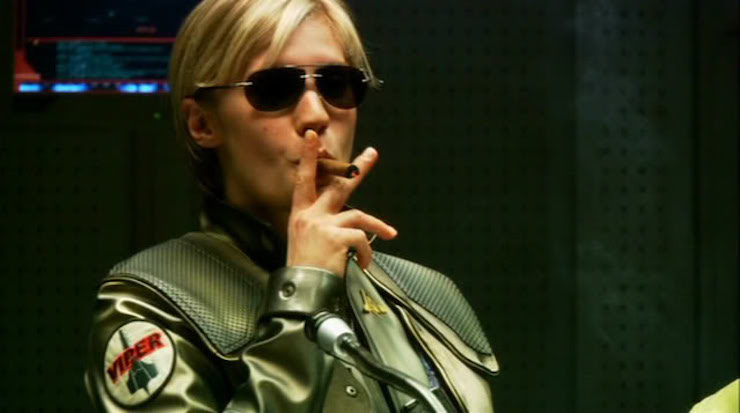Fans of serious science fiction might debate about the various merits of Star Trek versus Star Wars—but there’s another big space franchise that nearly everyone agrees is just as awesome as it is smart. The 2003-2009 SyFy Channel version of Battlestar Galactica is not only a beloved contemporary genre series but also considered by many to be the best sci-fi show of all time. Aficionados know this is a minor miracle simply because the critically acclaimed reboot show was based on a 1978 show with a dubious legacy and mixed reputation among fans of the genre.
But what do you really know about the making of both this modern sci-fi classic and its cheesy progenitor? If the answer is not frakking very much, then pop culture historians and long-time science fiction journalists Edward Gross and Mark A. Altman are here to help!
Gross and Altman’s new book So Say We All: The Complete Uncensored, Unauthorized Oral History of Battlestar Galactica is the definitive behind-the-scenes book for all things BSG. As the title suggests, Gross and Altman have compiled and conducted interviews with nearly everyone associated with both the original Galatica and the popular reboot. From Lorne Greene’s thoughts about playing space commander in 1978 to Edward James Olmos explaining what Galactica has in common with Blade Runner, everything you never thought you needed to know about this enduring science fiction phenomenon is here in one book.
Without ruining the joy of reading their exhaustive and enthralling oral history of both versions of Battlestar Galactica (and all the spin-offs) here are seven big things you’ll learn about the show only by reading the oral history.
The creator of the original Battlestar Galactica was sued by George Lucas
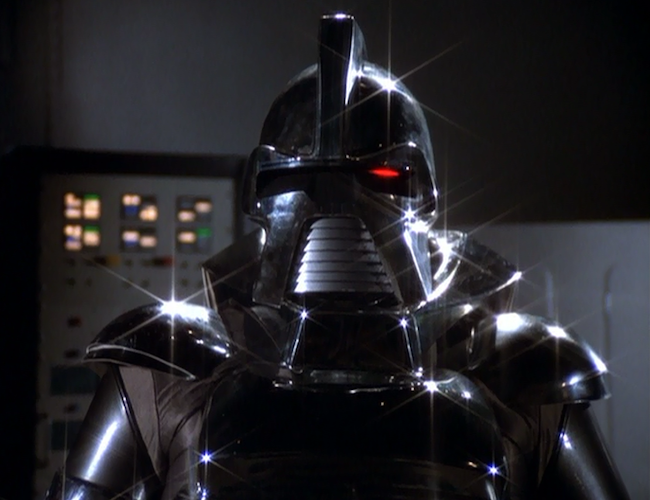
Even hardcore fans of Battlestar Galactica can admit the original show riffed on various aesthetics from the original 1977 Star Wars, partly because special effects legend John Dykstra previously worked on Star Wars. Glen A. Larson was so worried about getting sued by George Lucas that he made changes to the show before they even started filming, including the decision to avoid using red laser blasts on camera; instead, the guns on Galactica simply flash and then have an explosion happen as a result. But Lucasfilm and Fox sued Universal claiming that Battlestar Galactica had “at least thirty-four similarities” to Star Wars, including the idea that the tech of the show copied the lived-in, gritty quality of the tech in Star Wars. Fox and Lucasfilm claimed this was a key innovation on their part, “contrary to the stereotypical sleek, new appearance of space-age equipment” in other science fiction at the time. Fox and Lucasfilm eventually lost, but the lawsuit actually continued well after the original 1978 Battlestar Galactica was no longer on the air.
Buy the Book
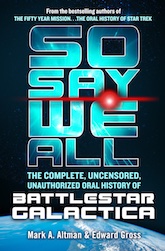

So Say We All: The Complete, Uncensored, Unauthorized Oral History of Battlestar Galactica
We nearly had a Dragonriders of Pern Series instead of the Battlestar Galactica reboot
After working on Star Trek: The Next Generation and Star Trek: Deep Space Nine, Ron Moore also did the hugely popular show Roswell, which led to him helping develop a live-action TV version of the beloved Anne McCaffrey Dragonriders of Pern books. Obviously, this series never actually happened, but Moore says that much of the hand-held camera style which made the reboot Battlestar Galactica famous was originally developed for the Pern series. Interestingly, one of the reasons Moore didn’t do the Pern series is because he clashed with the CW about the nature of the scripts, and after a fateful meeting with Harlan Ellison, realized he didn’t want to become a sell-out.
Edward James Olmos freaked out the entire cast during the “So say we all!” scene
At the end of the 2003 Battlestar Galactica miniseries, when Adama tells the crew that they’re going to go off in search of the mythological planet known as Earth, he initiates a call-and-response moment that defines the entire series. The director of the episode, Michael Rymer, reveals in the book that though the line “so say we all” was written in the script, Commander Adama was only supposed to say it once. But actor Edward James Olmos had other ideas and decided to inject impromptu rage and motivation into the scene through unexpected repetition. The large group of cast members and extras had no idea what was going on, meaning, the moment when everyone decides to start chanting back at Adama is a real moment of a group of people being won over on an idea.
Tricia Helfer almost lost the part of Number Six to a more famous actress
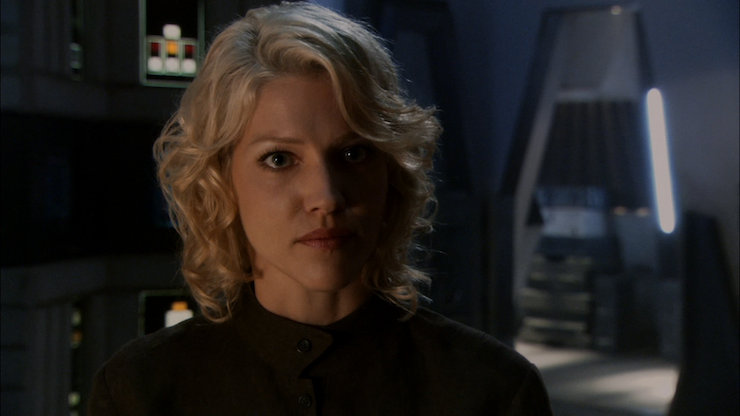
Though the book never reveals the identity of the other actress considered for the role, it’s very clear that Tricia Helfer nearly lost out to someone who had more name recognition. During early production at the SyFy Channel (then still called The Sci-Fi Channel), many executives were against casting Helfer because she was a model with zero acting experience. In the book, Helfer notes that ironically, even though the studio wasn’t convinced she was right for the part, they nonetheless used her image almost exclusively to market the first season of the show. Helfer thinks that she became the “centerpiece for the posters” because “the red dress and the white hair stuck out in a show that was filmed dark and documentary style.”
The time jump in the season 2 finale came from writer burnout
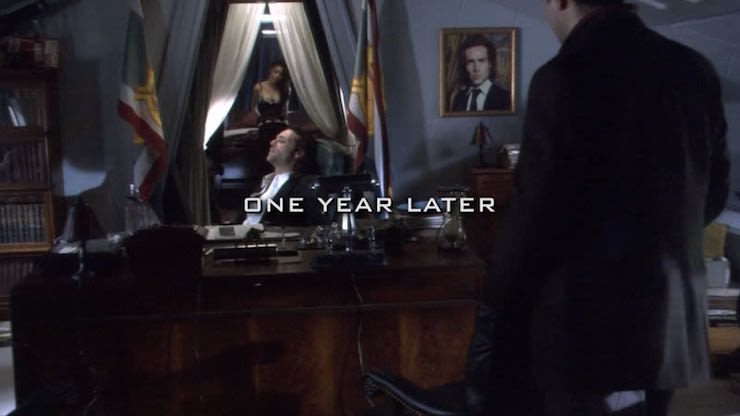
While closing in on the end of season 2, showrunner Ronald D. Moore was so burnt-out that he told producer David Eick that he was “done.” The two writing partners had slightly boozy lunch which Eick says resulted in the brainstorm about ending the second season with the now-famous “one year later” cliffhanger. Essentially, if Ron Moore hadn’t been tired and so close to quitting, that epic ending may never have been conceived.
Ronald D. Moore and David Eick cancelled their own show
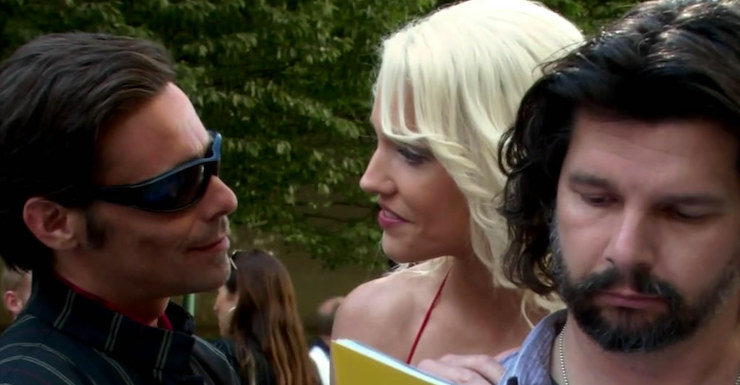
Though the writers of Battlestar Galactica had ongoing problems with Universal and the Sci-Fi Channel throughout the production of the first season, by the third season, the network was giving Moore and company less grief, mostly because the show was so critically acclaimed. In the book, Moore says that the network never really apologized or said: “you were right and we were wrong,” though they did ease up on worrying about whether or not the tone of the show was “too dark.” Even so, by the time the third season started, Moore and Eick jointly decided it was best to end things while the show was still good.
Starbuck’s true identity was made vague on purpose
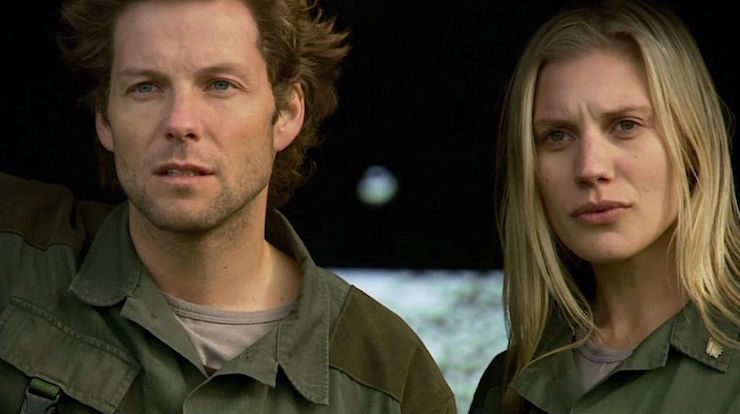
One of the biggest debates about the finale of the rebooted Battlestar Galactica was the mystery of Starbuck’s return from the dead, and the subsequent non-explanation of her just suddenly not being there when Lee turns his back while standing on Earth. Was the second version of Starbuck a guardian angel? Moore says that the writers’ room “debated various options” and that in the end, he felt a “bigger statement” was made by not answering the question directly. Eick says that if it had been his decision alone he “probably wouldn’t have veered in quite as inexplicable a direction.” Still, pretty much everyone in the book agrees, at a certain point, explaining how Kara “Starbuck” Thrace came back from the dead would have ruined the entire tone of the show.
So Say We All: The Complete Uncensored, Unauthorized Oral History of Battlestar Galactica is available from Tor Books.
Ryan Britt is a longtime contributor to Tor.com. He is the author of Luke Skywalker Can’t Read, and the entertainment editor for Fatherly.










